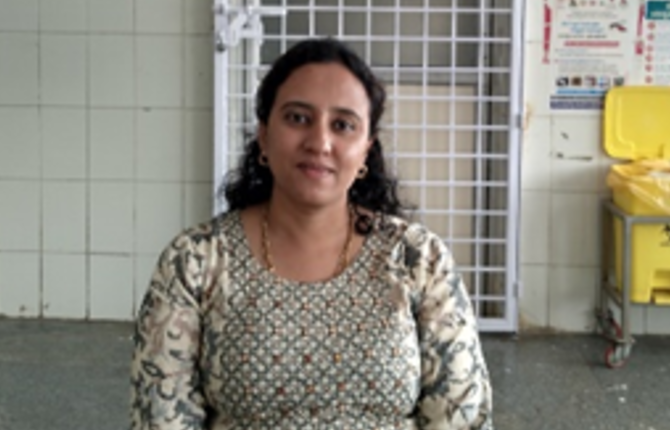From Silence to Strength: Empowering Women, One Question at a Time
Published on December 3, 2024
By Rajashree Kotabagi, Consultant, with contributions from Reeta Saxena, Senior Project Officer, MOMENTUM Safe Surgery in Family Planning and Obstetrics, India

Dr. Archana (36), a gynecologist with a decade of experience, works in the labor ward of General Hospital Bagepalli, Karnataka, India. The hospital sees a steady stream of expectant mothers, coming for their antenatal check-ups, hoping for a healthy and smiling baby. Dr. Archana, along with nurses, Manjula and Jyothi, face a common challenge. “Many of our patients are reluctant to open up about their social problems, even if there is abuse. They are often troubled by many thoughts—‘What if my family does not support me? Where should I go? What should I do? How will I live? Who will support me financially?’ Initially, they try to resolve their problems by talking to their family. If that does not work, they call elders to mediate. When even that fails, they often resign themselves to the situation. Most of our patients are poor or middle-class, and they lack the support needed to address these issues,” said Dr. Archana.
Dr. Archana attended a training on May 16, 2024, facilitated by MOMENTUM Safe Surgery in Family Planning and Obstetrics on a new screening tool for identifying gender-based violence (GBV) among antenatal care clients. She understood the tool’s importance during the training but had not anticipated just how vital it would become.
The first time Dr. Archana used the screening tool she felt a mix of apprehension and determination. She knew that violence against women was a silent epidemic. She was aware of the statistics: One third of women in India, and nearly half in Karnataka, have experienced GBV. Alarmingly, among women nationwide who have had a pregnancy, three percent report experiencing physical violence while pregnant.1 Violence during pregnancy can have serious ill effects on the health and well-being of pregnant women and their embryo or fetus.
Dr. Archana also understood that bringing such issues to light requires sensitivity, courage, and the right approach to asking the necessary questions. Initially, she felt nervous but was relieved that many clients consented to answering the screening tool questions. Over time, she honed the art of asking questions. “We’re asking all our patients a few extra questions to ensure their safety and well-being,” Dr. Archana explained. Citing an example of one client, Bhagya,2 Dr. Archana described how, at first, “Bhagya nodded, her eyes widening slightly, not showing any immediate signs of distress.” But as Dr. Archana continued through the questions, she noticed a change in the young woman’s demeanor. Her eyes darted away, and she began to fidget with her hands. When Dr. Archana gently asked if Bhagya had ever felt unsafe at home, Bhagya appeared thoughtful and then responded that she was 19 years old and pregnant with her first child. She fell in love and got married but had been suffering from mental abuse by her father-in-law, who was unhappy with the inter-caste marriage. Because of this suffering, she consumed mehndi (henna) plant leaves, which are known to be poisonous and can cause death.
When her husband found out, he brought Bhagya to Bagepalli Hospital. The duty doctor treated her, and both she and the baby were unharmed. Bhagya was discharged the next day. Dr. Archana and Nurse Manjula counseled Bhagya: “We have a Muktha center [offering GBV survivors temporary shelter with integrated medical, legal, and psycho-social services, similar to Sakhi One-Stop Centers] in the hospital where you can receive counseling, support, and all the necessary help,” Dr. Archana said. Bhagya agreed and was given a referral. “There is also a helpline you can call, and a trained counselor there will be able to assist you,” added Dr. Archana. After the screening, Dr. Archana thanked Bhagya for her responses.
To date, MOMENTUM has conducted training on the GBV screening tool for 40 healthcare providers and 41 staff nurses in eight facilities in Karnataka. These staff nurses and healthcare providers have screened 2,018 women during antenatal and postnatal care. Of those screened, 77 have been identified to be facing violence. These cases have been referred to Sakhi/Muktha centers.
Dr. Archana, Manjula, and Jyothi feel a profound sense of purpose. The screening tool has opened doors to conversations that might never happen otherwise. It is more than a set of questions; it is a lifeline for those in need of help. They understand that the journey ahead will not be easy, but there is hope. Dr. Archana knows she is making a difference, one patient at a time, and that breaking the silence is just the beginning.
Footnotes
- International Institute for Population Sciences, & ICF. (2021). National Family Health Survey (NFHS-5), 2019-21: India: Volume I. https://dhsprogram.com/pubs/pdf/FR375/FR375.pdf
- Client name changed to protect privacy.

